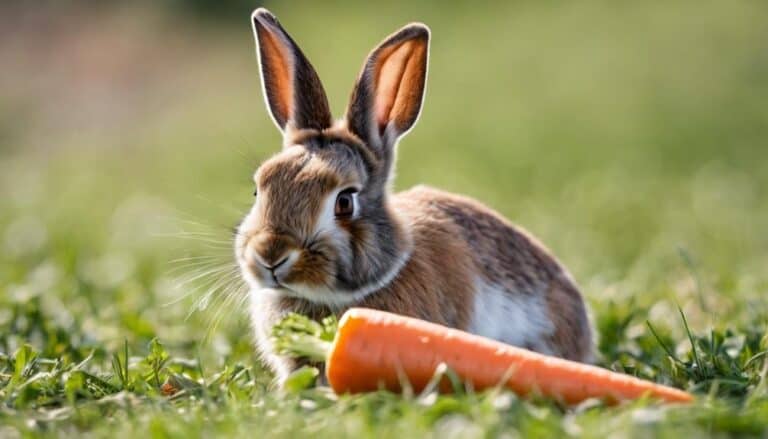You've probably heard the saying 'you are what you eat,' but when it comes to bunnies and avocados, it's vital to ponder the risks before offering this trendy fruit to your furry friend.
While avocados may seem like a healthy snack, there's a hidden danger that could jeopardize your bunny's well-being.
So, before you make any dietary decisions for your beloved pet, it might be wise to pause and think about whether bunnies can safely indulge in this popular green fruit.
Contents
- 1 Key Takeaways
- 2 Avocado: Potential Risks for Bunnies
- 3 Avocado Toxicity in Rabbits
- 4 Symptoms of Avocado Poisoning in Bunnies
- 5 Safe Alternatives to Avocado for Rabbits
- 6 Moderation: Avocado in Bunny Diets
- 7 Avocado and Bunny Digestive System
- 8 Conclusion: Can Bunnies Safely Eat Avocado?
- 9 Will Jicama Have the Same Negative Effects on Bunnies as Avocado?
- 10 Frequently Asked Questions
- 11 Conclusion
Key Takeaways
- Avocado is toxic to bunnies and can cause severe health complications.
- Opt for safe alternatives like leafy greens, fruits, and vegetables in a bunny's diet.
- Immediate vet intervention is crucial if a bunny ingests avocado.
- Veterinary care and an avocado-free diet are essential for bunny well-being and safety.
Avocado: Potential Risks for Bunnies
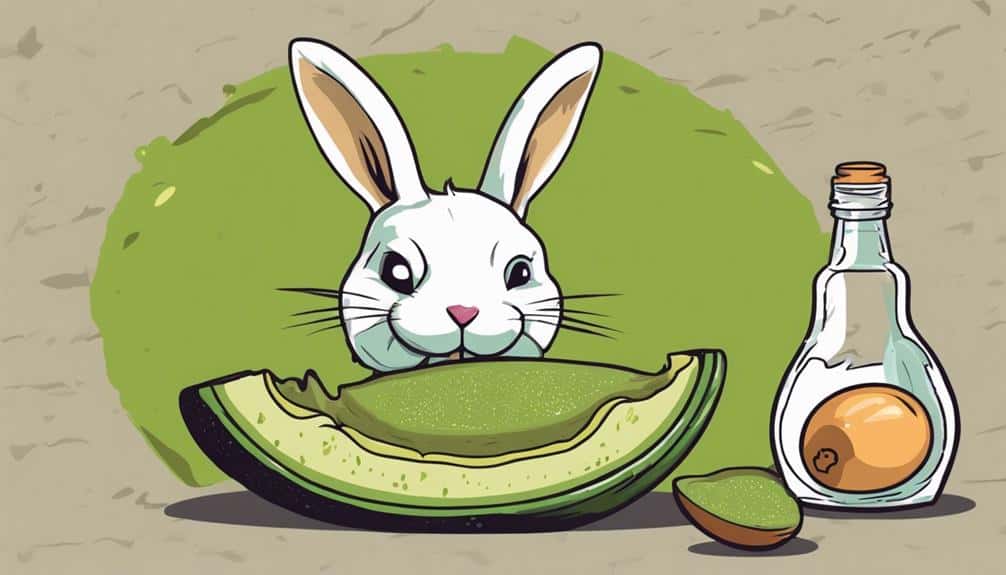
Avocado poses significant risks to bunnies due to the presence of persin, a harmful substance that can result in severe health complications, including behavior changes, breathing difficulties, heart failure, and potential fatality. Rabbits are particularly vulnerable to the toxic effects of avocado, with ingestion leading to dire consequences.
It's essential to be aware that all parts of the avocado plant, such as the flesh, skin, pit, and leaves, contain persin and are harmful to rabbits. The toxicity of avocado can quickly escalate, causing rapid deterioration in a bunny's health.
Immediate veterinary intervention is paramount if you suspect your rabbit has consumed avocado, as prompt medical attention can mitigate the adverse effects and potentially save your pet's life.
Avocado Toxicity in Rabbits
Due to the presence of persin, a harmful compound, rabbits face significant health risks when exposed to avocado. Persin is a toxin found in all parts of the avocado plant, including the flesh, skin, pit, and leaves. This toxicity can lead to severe health issues in rabbits, ranging from behavior changes to heart failure and, in extreme cases, even death. Avocados are considered unsafe for rabbits primarily due to their high-fat content, which is unnecessary for a rabbit's fiber-rich diet. Consuming avocados can result in gastrointestinal distress and other adverse effects on a rabbit's well-being.
It is essential to be cautious and prevent rabbits from accessing avocados to avoid potential toxicity. If a rabbit has ingested avocado, immediate veterinary attention is vital to mitigate the harmful effects and safeguard the rabbit's health and safety. Remember to keep avocados and any products containing avocado away from your pet rabbit to prevent any incidents of toxicity.
Symptoms of Avocado Poisoning in Bunnies
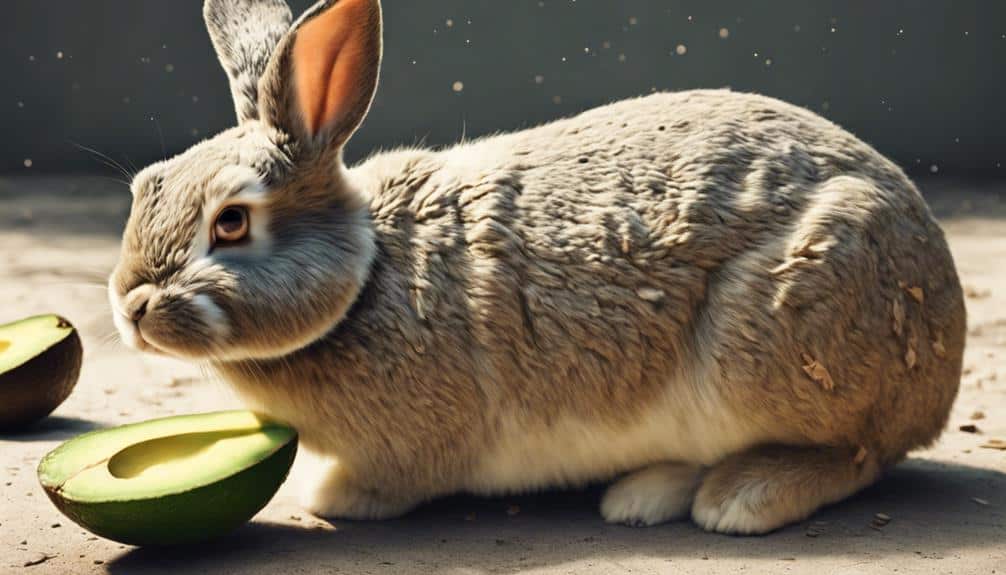
Symptoms of avocado poisoning in bunnies include potential signs such as difficulty breathing and swollen limbs. If your bunny has ingested avocado, watch out for these symptoms:
- Difficulty Breathing: Avocado contains persin, a toxic compound for rabbits that can lead to respiratory distress. If you notice your bunny struggling to breathe or showing signs of labored breathing, it could indicate avocado poisoning.
- Swollen Limbs: Another common symptom of avocado poisoning in bunnies is swollen limbs. If you observe any abnormal swelling in your bunny's legs or other body parts after consuming avocado, seeking immediate veterinary attention is crucial.
- Gastrointestinal Distress: Avocado consumption can also result in gastrointestinal issues such as diarrhea, vomiting, or lack of appetite. If your bunny displays these symptoms along with a history of avocado ingestion, contacting a veterinarian promptly is vital to prevent further complications.
Safe Alternatives to Avocado for Rabbits
Consider incorporating a variety of leafy greens, rabbit-friendly fruits, and vegetables as safe alternatives to avocado in your bunny's diet for best health. Rabbits eat foods high in nutrients like romaine lettuce and kale, which are excellent choices to replace avocado. These leafy greens not only provide essential vitamins and minerals but also aid in digestion.
Additionally, opt for rabbit-approved fruits such as strawberries and blueberries as tasty treats that are safe for your bunny. Vegetables like bell peppers and carrots are other great options to think about, offering a crunchy texture and a rich source of nutrients without the potential risks associated with avocado.
You can also introduce herbs like parsley and cilantro to add flavor to your rabbit's meals while ensuring a healthy diet. By providing a balanced meal plan consisting of Timothy hay, fresh water, and these approved alternatives, you can promote best nutrition for your rabbit without the need for avocado.
Moderation: Avocado in Bunny Diets
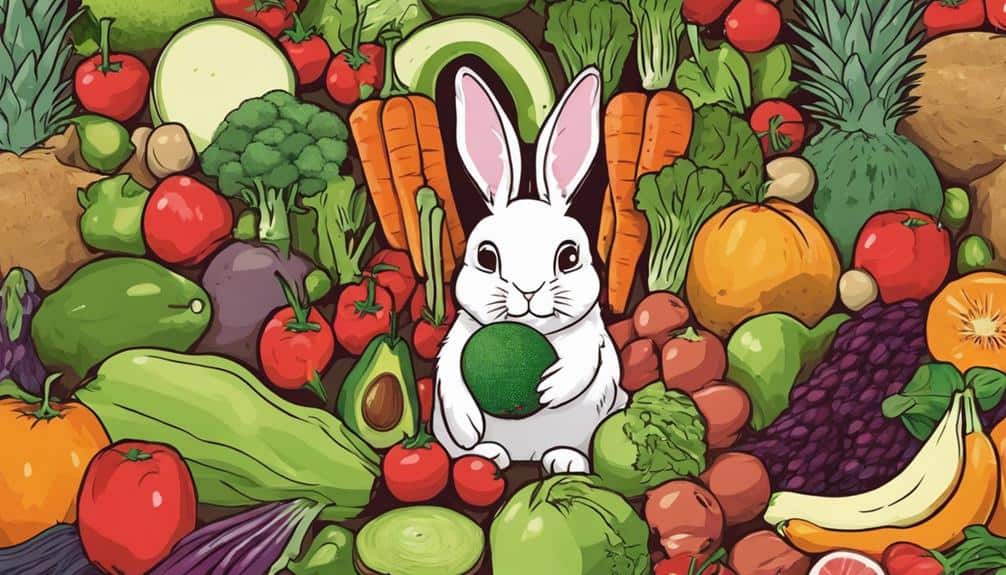
When considering including avocado in your bunny's diet, it's important to be aware of the potential risks associated with this fruit. Avocado does offer some nutritional benefits, but the dangers it poses to rabbits, such as breathing issues and even death, outweigh any potential advantages.
Always consult with a veterinarian for guidance on safe serving sizes and suitable alternatives to guarantee your bunny's well-being.
Avocado Nutritional Benefits
High in healthy fats, fiber, and essential nutrients like vitamin K, folate, and vitamin E, avocados offer valuable nutritional benefits for bunnies when included in moderation in their diets.
When considering avocado for your bunny, keep in mind the following:
- Healthy Fats: Avocados contain monounsaturated fats that can support your bunny's overall health.
- Fiber: The fiber in avocados can aid in digestion and promote gut health for your bunny.
- Essential Nutrients: Avocados provide essential vitamins like vitamin K, folate, and vitamin E, contributing to your bunny's overall well-being.
Potential Risks for Bunnies
While avocados offer valuable nutritional benefits, it is important to be aware of the potential risks they pose to bunnies when considering their inclusion in bunny diets. Avocado is toxic to bunnies due to the presence of persin, a harmful substance that can lead to severe health issues. Symptoms of avocado toxicity in herbivores like bunnies include difficulty breathing, swollen limbs, and potential fatalities. It is vital to understand that bunnies have a specialized digestive system, making them particularly sensitive to certain foods. Avoid feeding avocados to pet rabbits to prevent adverse effects on their health. Immediate veterinary attention is necessary if a bunny shows signs of having ingested avocado to avoid severe repercussions. Consult a veterinarian for safe dietary options for bunnies and refrain from including avocado in their diets.
| Potential Risks for Bunnies | ||
|---|---|---|
| Toxicity to bunnies | Harmful substance persin | Severe health issues |
| Symptoms in herbivores | Difficulty breathing | Swollen limbs |
| Sensitivity of digestive system | Specialized digestive | Avoid feeding avocados |
Recommended Serving Sizes
To make sure the well-being of your bunny, it's imperative to carefully consider recommended serving sizes when incorporating avocado into their diet. Here are some key points to keep in mind:
- Small Amounts: Even though avocados aren't recommended for rabbits, if you must include them in their diet, make sure it's in very small quantities.
- Consultation: Always consult with a rabbit-savvy veterinarian before introducing any new food into your rabbit's diet, including avocado.
- Monitor Closely: If you suspect your bunny has ingested avocado, monitor them closely for any signs of distress or symptoms of avocado toxicity, and seek immediate veterinary assistance.
Avocado and Bunny Digestive System
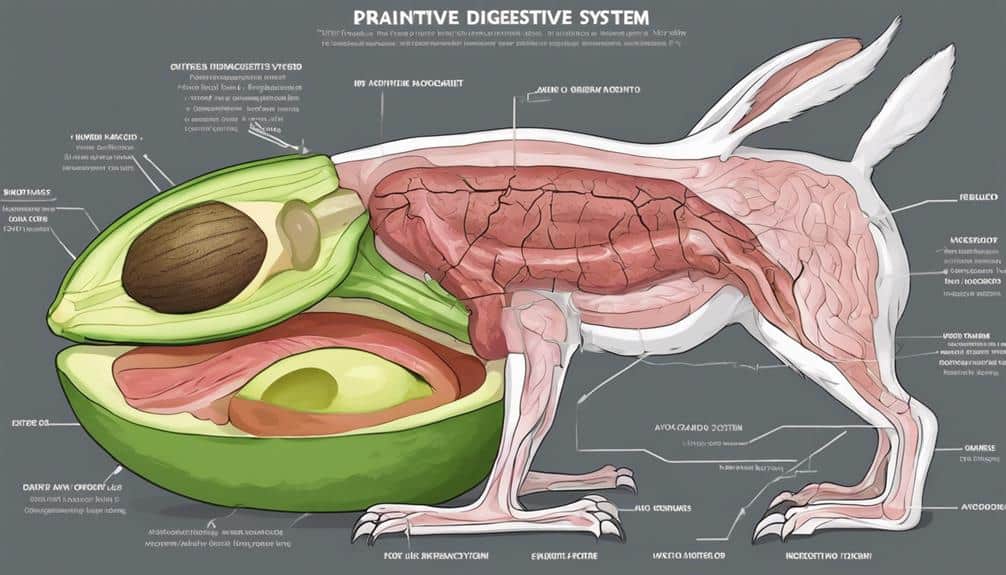
When considering the digestive system of bunnies, it's important to understand the potential harm that avocado can pose due to the presence of the toxic compound persin. Bunnies lack the necessary enzymes to digest avocado properly, making it difficult for them to break down this fruit.
Ingesting avocado can lead to digestive upset, breathing difficulties, and potential fatalities in bunnies. The consumption of avocado can cause severe health issues in bunnies, impacting their overall well-being. It's vital to avoid feeding avocados to bunnies to prevent adverse effects on their digestive system.
Conclusion: Can Bunnies Safely Eat Avocado?
Considering the dangers avocado poses to bunnies due to the presence of persin, it's important to prioritize their safety by strictly avoiding this fruit in their diet. Feeding rabbits avocados can have severe consequences, including heart failure, due to the toxic nature of persin in this fruit. To guarantee the well-being of your furry companions, here are some critical points to remember:
- Avoidance is Key: Completely eliminate avocados from your rabbit's diet to prevent any potential harm or health risks associated with persin consumption.
- Immediate Action: If you suspect your rabbit has ingested avocado or shows any signs of distress after potential exposure, seek immediate veterinary assistance to address any health issues promptly.
- Safety First: Always prioritize your rabbit's safety by being cautious about the foods you offer them, ensuring they're free from any harmful substances like persin found in avocados.
Will Jicama Have the Same Negative Effects on Bunnies as Avocado?
Many rabbit owners wonder if bunnies eating jicama safely is a concern like avocados. Fortunately, jicama is safe for rabbits to consume and can even provide essential nutrients. While avocados can be harmful to rabbits, jicama is a healthy and safe option for them to enjoy in moderation.
Frequently Asked Questions
What Foods Can Rabbits Not Eat?
You should know what foods rabbits cannot eat. Bunny dietary restrictions are essential; avoid chocolate, fruit seeds, raw onions, garlic, meat, eggs, and dairy. Common misconceptions may harm your pet. Stay cautious and informed to keep your bunny healthy.
What Is Toxic to Rabbits?
When it comes to what is toxic to rabbits, be aware of common household toxins and poisonous plants. Some substances, like avocados, can be harmful and even fatal to rabbits. Always prioritize your pet's safety.
What Vegetables Do Rabbits Not Eat?
When considering vegetable alternatives for your rabbit, it is crucial to be aware of rabbit dietary restrictions. Avoid onions, leeks, and garlic as they can cause harm. Opt for safe greens like parsley and cilantro instead.
Is There Any Fruit Rabbits Can Eat?
You can offer your bunny safe fruits like apples, bananas, berries, and melons. Remember to introduce them gradually and remove any seeds or stems. Avocado alternatives are a great choice, just avoid high-sugar fruits to keep your rabbit healthy.
Conclusion
To wrap up, it's important to remember that bunnies shouldn't eat avocados due to the potential risks associated with persin toxicity. Keep your furry friends safe by avoiding avocados in their diet and opting for safe alternatives recommended by a veterinarian.
Remember, when it comes to your bunny's health, is it worth taking the risk with avocados? Stay informed and keep your bunny happy and healthy.

